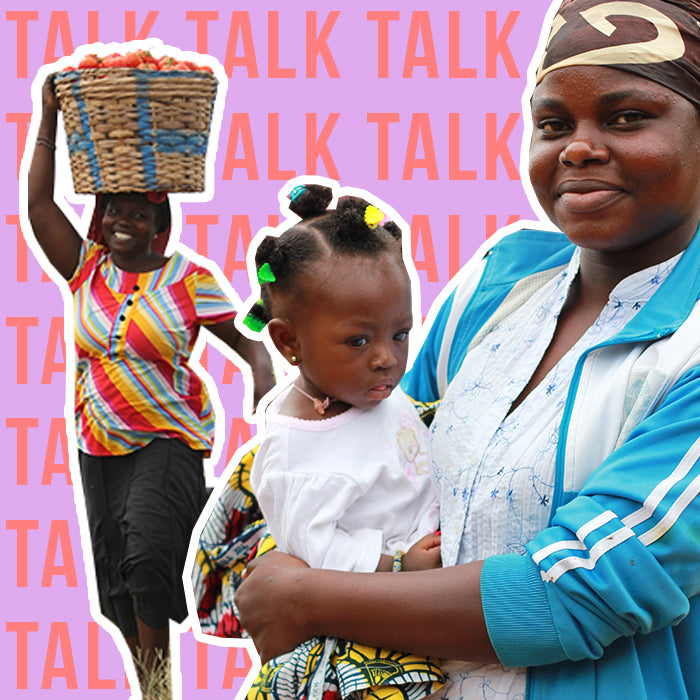

A talk with the hunger project - More than chocolate
As you know, Hey Tiger is all about mind blowing chocolate with surprising flavours that knock you off your seat. What you may not know is that we’re a social enterprise and we partner with The Hunger Project to help positively impact cocoa farming communities in West Africa.
How is Hey Tiger helping to make a positive impact, you ask? Well, we’re owned by a charitable trust, our CEO and Founder does not take a salary, all of our cocoa is ethically sourced and we help fund community development projects by donating 50c per sale of each full size bar and 25c per mini bar. To begin with, we’ve committed to a minimum donation of $25,000 per annum but we have big plans to increase our impact as Hey Tiger grows.
We had a chat with Melanie Noden, the CEO and of The Hunger Project Australia to give you some more insight into this amazing organisation and how they are making a positive impact.
ABOUT THE HUNGER PROJECT
Hey Melanie!
Hey Tiger!
So tell us, who is the Hunger Project?
The Hunger Project is a global community of people committed to ending hunger. It includes people from cities across Australia, the US and Europe, in partnership with people living in remote villages in India and Bangladesh, and right over to East and West Africa. Everyone in The Hunger Project shares a vision for a world free from chronic, persistent hunger; a world where everyone leads a healthy, fulfilling life of self-reliance and dignity.
Who do you support and why?
We work with the poorest of the poor; people who have lived in hunger and poverty for generations. Rather than see them as 805 million mouths to feed, we see them as 805 million resourceful people! They are the key to the end of hunger. Our work is to unleash their leadership and capacity so they can take action in their lives and villages to end hunger once and for all.
What are the benefits that THP provides to these communities in need?
We don’t do food handouts or aid; instead, we shift the mindsets of women and men so they transform into leaders for the sustainable end of hunger. Then, through our programs such as education, microfinance, agriculture and health, we empower people with the skills, knowledge and resources they need to break the poverty cycle themselves. This way, our work is sustainable. Also, we get a lot out of our work too! The people we train are incredible leaders, and we have a lot to learn from them too to transform our own lives.
What challenges does THP currently face?
Ending hunger can seem like a big, overwhelming task! 805 million people currently live in hunger, and that’s simply unacceptable. It’s going to take more than business as usual to make an impact. It’s great that the world has now aligned around 17 Global Goals which say – like we’ve always said! – that it’s possible to end hunger, and they’ve put a deadline on it (the year 2030). It’s exciting that the world’s perspective has shifted, and people really see that ending hunger can be done.
What has been the biggest wins for THP in the past few years?
We love the growing awareness among individuals and businesses (like Hey Tiger!) that giving back is important – and that it can be fun and meaningful! That’s a win for us, and for the world generally. Also, we’re really proud that 22 Hunger Project communities (that’s 395,248 people) have reached self-reliance since 2015. That means they have demonstrated the skills and capacity to continue their development, independent of The Hunger Project. Then, we can withdraw from those communities, and begin work with others instead. Finally, we recently reached the milestone of training 175,000 women in India who are bringing water, education and electricity to millions of people in their villages. The impact is mind blowing!
For those reading this, how can they support and get behind the Hunger Project?
One great way to support The Hunger Project is to support the businesses (like Hey Tiger!) who partner with us! Another way is to invest some of your own money each month to the end of hunger – it’s a simple action, and so effective, especially when your money gets pooled with money from others around the world. We also offer opportunities to learn about leadership directly from people in our Program Countries. For all of this and more, go to www.thp.org.au
What is the one thing you would like our readers to take away from this interview?
One of my favourite things about The Hunger Project is that we believe that you don’t have to be a CEO or manager to be a leader. Find what lights you up, and be a leader for that in the world. Transforming the world will take something from each one of us. What is it that we can count on you for?
ABOUT MELANIE
CEO OF THE HUNGER PROJECT AUSTRALIA

Thank you so much for all that Melanie! But before you go, we would like to know a little more about you! What is your role at the Hunger Project?
I’m the CEO of The Hunger Project Australia. I lead the team here in Australia, and work in partnership with CEOs and Country Directors of The Hunger Project offices across the world. I love working with others who share my goal of ending hunger globally.
What’s your favourite story from working at THP?
I’ve been lucky enough to visit 4 Hunger Project Program Countries – India, Senegal, Ghana and Uganda. Each time I have met amazing leaders whose stories have stuck with me. For example, one incredible woman I met is Alicia who lived with her extended family – 10 adults and 10 children! Accessing microfinance loans and financial literacy classes through The Hunger Project had transformed her life. With her loan, she bought a sewing machine and sewing supplies, and now her tailoring business has grown so much that she employs 3 apprentices. Alicia is just one example of the 34,000 women who were trained in microfinance by The Hunger Project in Africa last year.
To close it off and leave our readers with some inspiration, can you share your life mantra?
Be brave! In the face of an immense task like ending hunger, this is absolutely required! I channel the strength of our village partners who overcome huge obstacles on a daily basis and bring that through to my work for The Hunger Project. For example, when I speak to people about investing their resources into our work, it can be uncomfortable to try and shift their mindsets around what they are able to commit to. I've learned from our village partners about being bold and having important conversations so that together we can achieve something enormous: the end of hunger.
Sign up to our newsletter
Join the Hey Tiger community to be the first to know about exciting updates, new releases, and exclusive offers.
